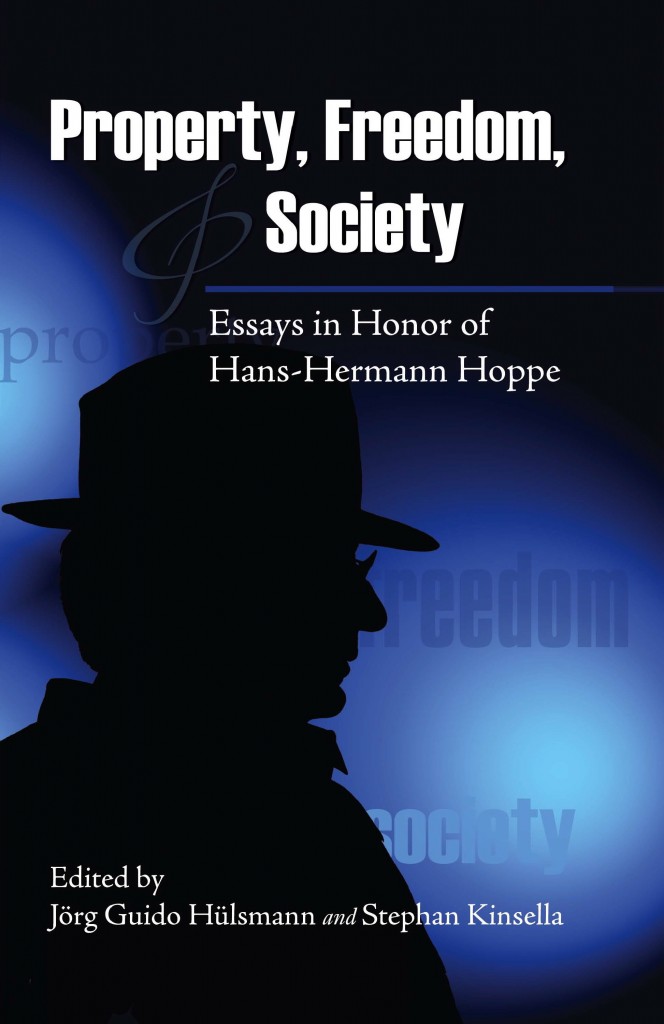Property and Freedom Podcast, Episode 266.
This talk is from the recently-concluded Seventeenth Annual (2023) Meeting of the Property and Freedom Society, Sept. 21-26, 2023.
Doug French (USA): “The Financial Newsletter Racket”
Other talks to follow in due course.
From the transcript from PFP269 | French, Hoppe, Šíma, Richard, Kinsella, “Discussion, Q&A” (PFS 2023):
Unknown Speaker (Audience): I have three quick questions. For Doug: What are your three favorite financial newsletters? …
DF: First of all, my favorite, by far—and I am a paid-up subscriber—is Grant’s Interest Rate Observer, which has been in business for 40 years. The primary writer and proprietor is James Grant. If you haven’t read James Grant, he has many books and is a big fan of the Austrian School. It’s probably in every other newsletter he mentions Austrian work in one way or another. It’s expensive, I will tell you that, but it’s not as big on actionable ideas and hyperbolic pronouncements. A lot of it is economic history. So if you have the time and you’re interested in just great financial writing, Grant’s Interest Rate Observer is a wonderful publication.
Secondly, I also subscribe to what I consider a financial newsletter, even though they are videos online, and it’s called Real Vision. Real Vision follows the same format. It has a free daily that you can get either on X or you can sign up for it. You get long-form, 30-minute interviews that are quite insightful by people who are outside the CNBC typical financial framework.
Then they have a next step, which is called the Essential step—I forgot what they’re charging for that—and then beyond that, if you really want to dive deep into this stuff, they have another level. It’s set up just like a financial newsletter. Raoul Pal is the proprietor of this. He lives very nicely in the Cayman Islands, it sounds like. I find it very useful because it gives a variety of points of view and makes me think, even though I’m listening to somebody that I don’t necessarily agree with. Sometimes, Keynes said that at some point, you don’t judge the merits of individual securities; you try to guess what the public is going to do next. From that kind of newsletter, from Real Vision, I would recommend trying to do that.
I struggle to find a third because it falls off very quickly, but there probably are others out there. I know people who, until his recent death, were dedicated subscribers to Gary North, and who a few of us know. They were very happy with his work. Those are the two that I can think of.
As far as general advice is concerned, somebody like Doug Casey is, of course, useful, but there’s not so much direct financial advice but simply making you aware of the dangers of the world and how you can protect yourself against those dangers. He thinks along the same lines that we think. I had him here a number of years ago too. He has this website, International Man, I think it is called, that is useful to read, but not if you think, “I will become rich and follow his advice.” He advises you just if you want to protect yourself from inflation, investment in gold and gold mines might be a good idea, and things of that nature—very useful but not directly useful on your way to becoming a multimillionaire.
…
Unknown Speaker (Audience): A short question for Doug: I was curious if you’re going to have a third part of your series and what it might be about.
DF: Did you have a question for me? What was it? If there’s a third part of your series, what would it be? Well, our gracious host here has not signed on to this yet, but yes, I do have a third part planned. It’s already written, and I’ll tell you what it is: it’s the entrepreneurship academic entrepreneurship racket of teaching entrepreneurship, or as I might call it, teaching the unteachable.
I’ve done the work already; I’ve done the paper. Yes, if there is interest in hearing about that, I know that there are plenty of Austrian friends of ours who are making a handsome living at various US universities, but virtually every US university is now adding an entrepreneurship program because young people view entrepreneurship as being rich. They want to be rich; they want to own their own company, and they believe that’s something you can sit in a classroom and learn. History certainly defies that.
So, yes, that would be the third part to the racket series if there is an interest in anyone wanting to hear it.
HHH: To these people, I would also say, if you are so smart, why ain’t you rich? No, entrepreneurship cannot be taught. The only thing that economists can do for entrepreneurs is to help them avoid absolutely stupid mistakes. But that’s the most that they can do. If you see the money supply going up all over constantly, and then people expect that prices will fall next year, obviously, they are making a big mistake. But those are the only things that we can tell them.
There are many successful entrepreneurs who are dumb when it comes to passing a microeconomics class with myself, but nonetheless, they are far richer than I am. Obviously, they have skills that I don’t have, and you cannot teach these sorts of skills. If you could teach them, then you could not even explain why there are successful people and unsuccessful people because then there would be some sort of algorithm that you have to follow, and then you will be a successful man. I don’t know anything about these artificial intelligence things so far, but some people think that artificial intelligence will allow us to make successful predictions in terms of the stock market.
I think that is also all nonsense. If that would really be the case, then all people would use the same sort of artificial intelligence and make the same forecast. But if all people make the same forecast, then these people will not be rich because all buy the same stocks. So, artificial intelligence will not help us. They help us to do certain routine things more easily. I think judges will have difficulties keeping their jobs in the same number because artificial intelligence will tell them all the judgments that were made in similar cases. People who write fundraising letters or something like that—there exist probably thousands of fundraising letters, and artificial intelligence will write a nice letter to tell people why they have to donate for this or that instead of employing deep thinkers to write these fundraising letters. Artificial intelligence can probably just turn them out in a minute for any type of purpose for which you want to raise funds. But entrepreneurship cannot be taught.
Peter Wong (Lion Rock Institute) (Hong Kong) (Audience): I have some statements to make in response to Doug as well as Dr. Hoppe’s comment on Doug Casey. I try to defend the indefensible regarding newsletters because I’m currently a writer in a financial column. I don’t know whether I should be classified as one of those newsletter producers, and in a way, maybe I’m also selling snake oil.
Personally, I write a financial newspaper column not because I want to teach people how to get rich—firstly, I’m not rich, so I cannot teach people how to be rich. But before I wrote the financial newspaper, I ran a think tank with Nick for a period of time. I tried to get donations from donors and offered the material basically for free regarding free-market teaching. From my point of view, it didn’t work very well. It’s free material, and not many people care.
But as soon as I put something financial on—what I’m saying is basically the same thing, but I just change the terms with different marketing—people listen to me. I have no intention of making them rich, and I think this is not teachable. Of course, I need to say something, “Oh, this company, based on my knowledge in economics, I think this company runs very well.” I don’t give the timing of when you should buy, I don’t give the entry price, I don’t give at what price you should sell. I just say, “This is a good company because they run it this way. I would love to own the share.” But if you can make money or not, I have no guarantee.
In the past, I needed to get money from donors, offer the material for free, but as soon as I change the clothes, people pay me to say the same thing. I don’t know the other people in the newsletter industry; maybe they just want to make money, maybe they just want to sell snake oil, but for me, it’s just a market technique to draw eyeballs.
DF: Yeah, we agree on this, right? I give financial advice sometimes too. I just think that might be a good idea, or that one, no, I don’t think I would touch that. Everybody does it. I think Josef is in that business also, right? You give advice. Say something.
Peter Wong (Lion Rock Institute) (Hong Kong) (Audience): I have some statements to make in response to Doug as well as Dr. Hoppe’s comment on Doug Casey. I try to defend the indefensible regarding newsletters because I’m currently a writer in a financial column. I don’t know whether I should be classified as one of those newsletter producers, and in a way, maybe I’m also selling snake oil.
Personally, I write a financial newspaper column not because I want to teach people how to get rich—firstly, I’m not rich, so I cannot teach people how to be rich. But before I wrote the financial newspaper, I ran a think tank with Nick for a period of time. I tried to get donations from donors and offered the material basically for free regarding free-market teaching. But from my point of view, it didn’t work very well. It’s free material, and not many people care.
But as soon as I put something financial on—what I’m saying is basically the same thing, but I just change the terms with different marketing—people listen to me. I have no intention of making them rich, and I think this is not teachable. Of course, I need to say something, “Oh, this company, based on my knowledge in economics, I think this company runs very well.” I don’t give the timing of when you should buy, I don’t give the entry price, I wouldn’t give at what price you should sell. I just say, “This is a good company because they run it this way. I would love to own the share.” But whether you can make money or not, I have no guarantee.
In the past, I needed to get money from donors, offer the material for free, but as soon as I change the clothes, people pay me to say the same thing. I don’t know the other people in the newsletter industry; maybe they just want to make money, maybe they just want to sell snake oil, I don’t know, but for me, it’s just a market technique to draw eyeballs.
HHH: Basically, we agree on this, right? I give financial advice sometimes too. I just think that might be a good idea, or that one, no, I don’t think I would touch that. Everybody does it. I think Josef is in that business also, right? You give advice.
Podcast: Play in new window | Download (21.8MB)






You must log in to post a comment. Log in now.